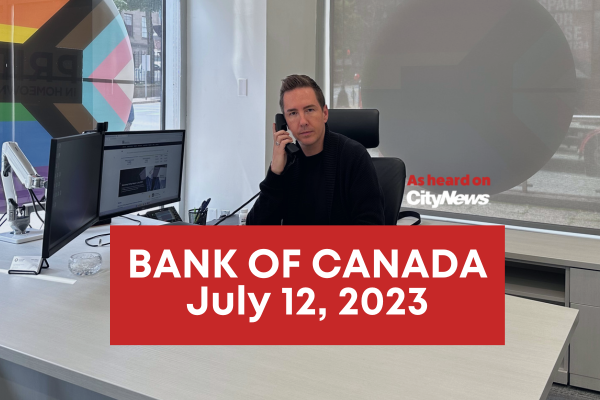Clinton Wilkins joins Global News as they report on the Federal plan for addressing Canada's housing crisis. Included in the report are comments from the Federal Housing Minister Sean Fraser, emphasizing collaboration across all levels of government to improve affordability and accessibility of housing.

Bank Of Canada – An Unwelcome Rate Hike | June 12, 2023
Clinton Wilkins joins Sam Laprade on CityNews to discuss the Bank Of Canada’s latest interest rate hike, how Canadians are impacted and what we can do to weather the storm.
Sam Laprade 00:01
Sam Laprade show continues on City News 1011 FM and 1310am.
Sam Laprade 00:10
And we’re back on City News. I always catch up with Clinton Wilkins from Centum Home Lenders Ltd on these big days for the Bank of Canada, and today is no different. Hi, Clinton.
Clinton Wilkins 00:23
Hi Sam, how are you?
Bank Of Canada raises interest rate to 5%
Sam Laprade 00:24
Good. We were watching with bated breath, many people holding their breath in this country knowing that that interest rate was probably going to get hiked today. 25 basis points bring it to 5%. This wasn’t a surprise thought, Clinton?
Clinton Wilkins 00:39
No, the economists were certainly projecting that we had some room for another increase. And Sam, I think with the job numbers that came out here just a few days ago, it was imminent that there was going to be an increase. There were 60,000 new jobs added in Canada. And really, the economy is still chugging along at a pace that the Bank Of Canada is not comfortable with just due to this level of inflation. You know, some positive notes, you know, with last month that the inflation numbers were certainly down a bit, but it’s not where they want it to be. I think the big concern here is we haven’t seen the full effect of the previous increases. Bank Of Canada just wants to start slowing the economy more than it’s slowing right now.
Sam Laprade 01:17
Yeah, for sure. Let’s, let’s just take somebody, for instance, let’s just think about a client that you might have Clinton that, you know, is kind of reeling right now maybe they’re in a variable and and they’re, you know, their mortgage payment has just gone up again, for the 10th time and in 18 months, what what advice are you giving them Clinton?
Weathering a storm of interest rates
Clinton Wilkins 01:38
Well, we’re at 22 year highs now, Sam. You know, the overnight rate has not been this high since March of 2001. So we’re certainly in a challenging time. I think that if you’re in a variable rate, you need to think about it, you need to really think about it as, is this product going to be right for you. If you’re starting to feel some financial pain, I think that there’s you know, you really need to start asking for help. I think talk to your lender, talk to an unbiased mortgage professional, and really start figuring out what the best solution is going to be to weather the storm. Because right now we are in a storm in terms of interest rates. And it’s not just clients that are in a variable, Sam that are feeling the pain, we have lots of clients that are in a fixed rate that are coming up for renewal that are really starting to feel the pain, because as you know, rates are really high across the board. So some customers are looking at longer amortizations, I can tell you that’s very, very popular. We have a lot of clients that at renewal or even midterm are looking at extending their amortization to 25 or 30 years. And they understand that, obviously, they’re going to be paying the mortgage for a longer period of time. And really, what we’re hearing is, they want to do this for the short term, while the rates are high. And then once the rates soften again, start reducing their amortization.
Sam Laprade 02:50
I know it’s hard to sort of have that crystal ball but are you seeing that in the next two years, five years?
Everyone is going to be impacted but by the rate hike
Clinton Wilkins 02:58
I think rates are gonna be high all year, Sam, I think going into 2024, the rates are going to be high. You know, there’s already signs that a recession is, you know, on the horizon. The rates will certainly soften once we get into a recession type situation, when that will be. I think it really is going to be impacted by what it’s gonna happen with Canadians, you know, we were home for two years, really not spending any money, and then a huge amount of capital entered the market, inflation really became a runaway train, what the Bank Of Canada is really saying today, Sam is we need to stop spending, and that’s going to help slow, slow the inflation. And I think some people are going to stop spending because they don’t have any money, you know, there’s only going to be so much access to credit. And I think the people that are being impacted are really the middle class, you know, the lower income folks, they’re not borrowing money because they don’t have maybe have the access to credit. And I think the individuals that are on the upper end of spectrum in terms of wealth and income, they’re not so impacted by the rates. You know, the people that are really impacted are you and me, you know, we’re working class. And, you know, we’re certainly seeing an impact. And you know, I think everyone’s going to be impacted. And it’s not just homeowners, Sam that are being impacted. Obviously, if you’re in a variable rate mortgage, either your payment is going up, or your amortization is getting longer. But if you have a home equity line of credit, obviously, your cost of borrowing is going up. Or if you have any other debt products that are tied to the bank prime rate, your cost of borrowing is going up. So a lot of people are being impacted Sam, not just people that are in a variable rate mortgage. And we need to also remember that customers like businesses are being impacted, their access to credit as being impacted. So certainly there are going to be some repercussions. And I think that now the Bank Of Canada is taking the rest of the summer off, they’re not meeting again for now almost seven weeks. The next meeting is the first week of September, September 6th, the first Wednesday in September. And a lot of economists think now we’re going to be in a plateau situation. We thought we were in a plateau situation a couple of months ago as well. But what happened with inflation and what happened with the job market really forced the Bank Of Canada’s hand into another increase.
Sam Laprade 05:03
Yeah, it’s, you know, I think about this pandemic and, and you know, if I can sort of branch out a little bit from our conversation to think about families that, you know, maybe had a job loss, maybe there’s a separation in the family. There’s been so much going on because of the pandemic, and then layering on all these financial pieces, you know, I’m sure you’re having a lot of conversations with people that not only have have conversations at the kitchen table that are difficult about finances, but it’s layered on so many other pieces here, Clinton.
Focus on the needs, not the wants
Clinton Wilkins 05:37
Certainly, and Equifax and TransUnion, have put out some writing recently that they’re already starting to see some cracks in the Canadian credit profile. Canadians are starting to miss loan payments, maybe not so much mortgage payments. Normally, Canadians are pretty good at making their mortgage payments, but there’s some loan payments that are starting to go into arrears. So the cracks are already starting to show. And I think we’re in a situation now that we really need to focus on the needs versus the wants. We really need to look at our budget and figure out, you know, how can we weather the storm for the next 6, 12, 18 months? What is that going to look like? Can we sustain at this level going forward. And I think it’s a really important time to look at that and really try to minimize your output. And I know, that’s tough, because a lot of people have obligations that they’re committed to, and things like this in terms of, you know, loans and cars and things. But I can tell you, I have clients that I have on social media, for example, I know that they’re fixed rate at a very low rate, and I see them going out and leasing new cars and going out to eat all the time. And I know, people don’t want to necessarily change their lifestyle. But I think we’re in a situation now and I think many people are starting to feel this, we need to really worry about more about maintaining, and maybe giving up on some of the, some of the wants.
Sam Laprade 06:51
It’s such a tough conversation. And, and especially at this time of year, Clinton, you know, people are maybe planning a getaway and maybe having to, you know, as opposed to going away for a week, maybe it’s just a long weekend, you know, trying to make those decisions, but also live because we were, you know, we weren’t confined to our homes for a couple years,
Clinton Wilkins 07:09
We hadn’t been living. And that’s why we really wanted to live and I’m hearing from customers. And they said, you know, normally when I went on vacation, you know, I would spend $200 or $300 a day, and now going on vacation is costing $400 or $500 a day. So it’s everything, you know, really impacting the bottom line. And I think the really, you know, big thing, aside from obviously, mortgage interest, you know, the cost of fuel is very high. The food insecurity and the food cost is is a big concern. So we’re certainly, I think feeling it from every angle. And, you know, we’re starting to feel the impacts of this high inflation. And you know, income, obviously, is not pacing with what’s going on with inflation, and there’s less dollars for a normal household to really put out every month.
Sam Laprade 07:55
Clinton I know will speak on September the 6th, we already have a date you and I.
Clinton Wilkins 07:59
I know we already have a date, and we didn’t have a date, the last time around. I think maybe you were off for a week or so. So I’m looking forward to September 6. And, you know, I really wish all our listeners, you know, a good summer, and I don’t want to come on and just be the bearer of bad news. But I think it’s really important to you know, look in the mirror and figure out kind of what the best plan is going forward.
Sam Laprade 08:23
Yeah, realistic talk is important today, Clinton, thanks for your time always.
Clinton Wilkins 08:27
Thanks for having me.
Sam Laprade 08:28
Clinton Wilkins joining us today sent him home lenders Ltd. We appreciate his time we always speak with him, of course on these tiff Macklin days, also known as the Bank of Canada days. We appreciate his time.


